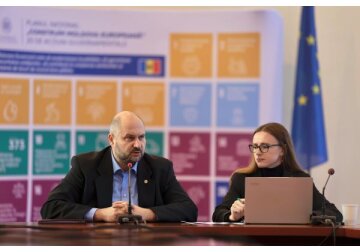
In Moldova, tenders for the construction of large wind and photovoltaic parks are planned to be announced in the second quarter.
As the Ministry of Energy reported, this was discussed during public consultations held by the department on January 12 on proposed changes to the Regulations on the organization of tenders for the construction of large renewable energy facilities with the participation of interested companies and industry associations. The changes will reflect new provisions in the Renewable Energy Promotion Act approved last year and will improve the regulatory framework for the construction of large-capacity photovoltaic and wind power plants under a “fixed price” mechanism. A total of 165 MW has been allocated for this mechanism, of which 105 MW is wind technology and 60 MW is photovoltaic. The first launch of fixed-price tenders for the construction of plants will allow the construction of large wind and photovoltaic parks, reduce dependence on energy imports, decarbonize the economy and create new jobs. The construction of these parks will help Moldova meet its commitment to achieve a 27% share of renewable energy in final electricity consumption by 2030. Energy Minister Victor Parlicov emphasized that the discussed changes are aimed at simplifying tender procedures and reducing the risks of future projects for the development of renewable energy. According to him, tenders should be announced at the beginning of the second quarter. Thus, the new regulation provides for additional stages of the tender, a more thorough pre-qualification check, increased guarantees of participation in the tender, and the right of the government to apply “statistical transfers” of renewable energy with other EU countries. At the same time, effective competition will be ensured and lower fixed prices will be obtained as a result of the tender procedure, which will be mutually beneficial for both successful producers and end consumers. Eligible generators will be eligible to enter into fixed price contracts and “contracts for difference” until the next day market and intraday, hourly energy market are established on the OPCOM platform. A contract for difference allows for better integration of producers into the market. In a two-way difference contract, producers will receive payment in the event of low market prices, but must return any excess above the strike price in the event of high electricity prices. The Ministry of Energy recalled that the state has three mechanisms to support producers of “green” energy, which guarantee the purchase of surplus energy supplied to the network, and thus help them recoup their investments: “net invoicing”, introduced on January 1, 2024, which applies to small producers with installations intended for their own consumption; fixed tariff for 15 years - for parks and installations with a capacity of up to 1 MW of photovoltaic or 4 MW of wind; fixed price, also valid for 15 years, for parks and installations with a capacity of over 1 MW of photovoltaic or 4 MW of wind, their capacity is allocated on a competitive basis. // 12.01.2024 — InfoMarket.







